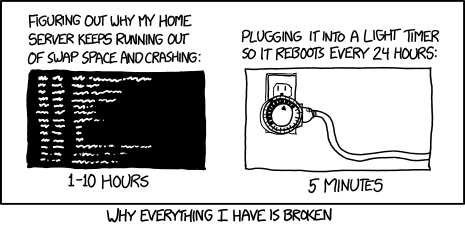Why do YOU Homelab?

The Internet is a Dangerous Place These Days (Introduction)
In this day and age, you really are taking a risk if you're not running some form of ad blocking. Heck, even CISA is telling government agencies this.
So I mentioned on the Fediverse that I was thinking about going back to using Pi-hole for this. It's quick to set up, super convenient, and all around does the job well.
At this, -dsr-, a long time online acquaintance whose opinions I respect, piped in with this:
Generally, when he speaks, I listen. His skill as a system administrator is formidable and to say that he has helped me out from time to time would be an understatement.
So I started down the rabbit hole of doing what he suggested and installing BIND in a VM and getting it set to use DNSRBL to perform the same kind of ad blocking Pi-hole does.
And then I realized something: This is absolutely positively the wrong tool for my use case.
Why? I'll answer that, but before I do, let's get down to the business of this post.
Why I Homelab
Over the last few years, people interested in technology have enjoyed an incredibly bounty of free and open source software. It's not just possible but easy to do things that would in past eras have taken incredible amounts of effort and physical hardware with a few hours of spare time, a relatively small amount of money, and maybe a smidgen of space on a desk somewhere.
There are all kinds of reasons one might wish to run various bits and bobs of infrastructure at home, and sometimes trying to figure out which rabbit hole to go down can be dizzying and maybe even a bit intimidating, and answering the Why question may be able to help you as it did me.
I run a bunch of my infrastructure at home myself rather than relying on cloud vendors because ultimately I want to enhance my privacy and, more importantly to me, take control of my technology life in a day and age when books can vanish from your Kindle in the dead of night, never to return, music you love can sink beneath the waves when your streaming service and a record company get into a tiff, and software you purchased with actual money can evaporate into a puff of bits because some company somewhere decided it wasn't profitable enough.
I'm not primarily doing it as a way to build skills for my career. I do feel like any time I flex my technical muscle I'm improving myself career wise though.
Why Others Might Homelab
There are all kinds of great reasons to run your own server hardware and software at home that don't match those I cited above. I want to cover a couple of them here.
Building Your Systems / Network Administration Skills
Depending on what you do for work, it can be incredibly hard to constantly evolve all the skills the job market is looking for in new hires. Whether you're currently working or looking for work, being able to honestly claim "Oh yeah, I've done that. I set it up in my Homelab" is a fabulous answer to have during an interview, and you can certainly add these new found skills to your resume so long as you're VERY honest with yourself about your actual level of mastery. Don't fall prey to the Dunning Kreuger Effect!
For example during my last job search I was finding employers REALLY wanted Kubernetes experience, so I set up Rancher in some VMs running on one of the ProxMox servers I have here. It was great and I learned a tun.
This is where -dsr-'s toot above really comes in. He's absolutely right, setting up BIND instead of a Pi-hole is most decidedly not hard for anyone with a reasonable degree of comfort with UNIX systems and infrastructure, and you win familiarity with one of the most important pieces of infrastructure software in the world - bind.
The Chance To Experiment With Zero Consequences
I don't know about you, but after 30 years working in the technology sector, I've lost count of the number of times I was asked to build some really truly complex piece of software or infrastructure, live, without a net. No test environments, no dry runs.
You'd better be good at running downhill while juggling chainsaws, because that's what you'll be asked to do. Over and over and OVER.
With a homelab, you can play, blow stuff up, shrug your shoulders and enjoy the satisfaction of knowing that you learned something from your failure and will know what to do next time.
This is what life as a technology professional should be like everywhere, but all too frequently isn't.
Why I Ultimately Chose Pi-hole
The answer is very simple: My lovely wife :)
In order to be an effective solution for us, she needs to be able to control the ad blocker we use.
The most critical thing is that she herself be able to add exceptions to the block list. With Pi-hole, that's as easy as surfing to the web address of Pi-hole's admin and entering a value.
There is absolutely positively zero chance of her learning a UNIX editor, much less BIND's configuration file format.
It's not that she couldn't do it if she wanted to, but she REALLY doesn't want to! Computers are appliances to her.
So, for my purposes, any desire to hone my sysadmin skills is irrelevant, at least for the purposes of this particular decision.
So, why do you homelab?
Comments